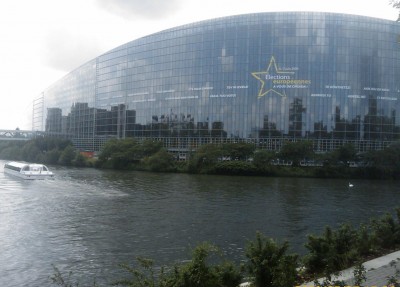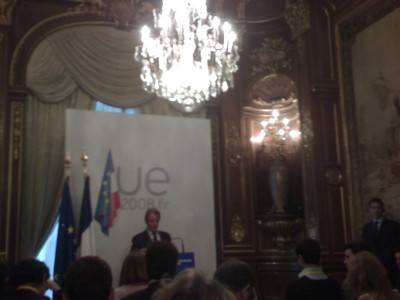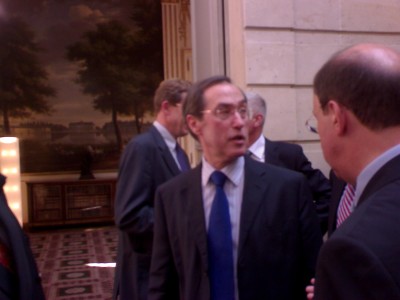Barroso postponed ?! EU Parliament's vote on July in Strasbourg uncertain.

The outcome of attempts for an early election of new EU Commission's President for 2009 - 2014, by finalising on July in Strasbourg Barroso's candidacy, who remains in office until October, looks uncertain, after demands for programme clarifications and/or the emergence of eventual competitors were facilitated by EU Governments' openings to various MEPs' wish to delay the nomination.
Such moves may theoretically lead EU Parliament towards either accepting Barroso only if he meets certain more crystal-clear conditions than his one-and-a-half page to EU Council, or electing someone else. But it might also endorse someone like Barroso only when Commission's role will be focused on "technical" matters, Political leadership being transferred into an EU President and EU Foreign Minister, after a probable adoption of EU Lisbon Treaty on early October.
Incoming Swedish EU chair's attempts to agree a rapid Barroso vote in EU Parliament in Strasbourg on July, failed, after most Presidents of MEPs' Political Groups (including of the largest : EPP : Joseph Daul of Strasbourg), declined or refused to visit Stockholm on June, preferring July.
----------------
French President Sarkozy, speaking recently in Paris together with German Chancellor Merkel, did not deny a question by a French Journalist whether the Time needed for an EU Parliament's vote might be enough for "other Candidates" to emerge. And after the Brussels short Council meeting he noted that the "absence of alternative" candidates "goes only for the moment", because "we are cautious", (since anything may happen meanwhile).
- "The July Time Deadline is too ambitious and hardly feasible : I'm sure that the pause is not long enough", replied later German Foreign Minister Steinmeier, standing side by side with chancellor Merkel, to a question "if it was sure that the new Commission's President will be elected on July". And Merkel did not deny.
- "But I can't yet mention any precise Date somewhere in September or October", added Steinmeier, without excluding anything.
Following the Sarkozy - Merkel main line (See previous NewsReport), a subsequent brief Council meeting in Brussels, opened the way to delays by abstaining to nominate Barroso on June, contrary to some other Governments' reported wish, (Socialist PM's of UK and Spain, Brown and Zapatero, Liberal PM of Sweden, Reinfeldt, etc).
Instead of that, the final Conclusions simply mentioned an "intent to nominate" Mr. Barroso, as Steinmeier pointed out : "There is No formal Decision", he stressed.
Simply, "we (EU Council) decided to start consultations with EU Parliament, to see if there might be a Majority, or not, for Mr. Barroso", it was added.
But, according to the latest rumours, there might be "No Majority" in EU Parliament for a Vote on July..
- "We must not set too rigid Time Deadlines, nor try to force things, because this will provoke reactions", Sarkozy said. And he confirmed that he prefers, for final decisions on all EU Top Jobs, to better wait until it becomes clear if Lisbon Treaty will be ratified, or not, by Ireland, in order to have an overall view, and put everything "in a balance". Something practically "impossible" before that.
- "It is necessary (for EU Council) to hold consultations with EU Parliament". "Whether and when a formal decision" could be taken, on the new EU Commission's President, "this will be seen, in the light of Consultations that will lead the Czech and Swedish EU Presidencues with EU Parliament, respectively on June and July", noted also German Chancellor Merkel.
Moreover, French President Sarkozy made it clear, that, Barroso or not Barroso, one thing is crystal clear : - "We need Change !", he stressed after Brussels' short meeting.
At any case, after the 2004 and 2007 EU Enlargements to 27 Member States, "the President of (EU) Commission has not enough Authority", contrary to what was done in the Past, observed Sarkozy.
- From now on, "EU's strength depends on whether we have a strong EU Council's chairmanship", he added, reminding that "EU Commission's area is Not Politics".
Nobody contests Barroso's experience, (useful in times of crisis), but, in fact, supporters, neutrals or adversaries obviously cut accross the usual political spectrum, not showing clearly what is really at stake.
His short open Letter to EU Governments gave some vague promises on Economic policy and EU Citizens, but didn't tell much about the controversial Enlargment to Turkey which was, nevertheless, at the focus of 2009 EU Elections in many important Countries, (except, perhaps, to mention a general "Partnership" between EU Commission and Governments).
For MEPs, who come with fresh Popular Legitimity after June 2009 EU Elections, add New Groups, and expect to augment EU Parliament's powers after the adoption of Lisbon Treaty, they might want to hear much more from Barroso (and/or any eventual other candidate), and, particularly, something more crystal-clear...
In EU Parliament, reportedly, most Socialist MEPs claim to be against a July vote, as also "Greens", while Liberals have doubts, Ind/Dem are against as well as several Independents and EuroLeft, Conservatives might accept, and EPP seems officially for, but...
However, things are expected to become more clear in the run up to July's Strasbourg Plenary, where definite choices will be made by official votes.
Among various other Names which may start to float, are Belgian former PM Verhofstadt (Liberal), Luxembourg's Prime Minister Juncker (a ChristianDemocrat/EPP who had been unanimously supported in 2004, but declined the offer), France's former Prime Ministers Juppe and/or Villepin (to whom Sarkozy had offered an EU job in the past), etc. If such or other similar eventual candidates emerge, the competition could become strong.
In these conditions, it wouldn't be surprising if Liberal Group's reportedly "mixed" stance might clearly turn towards postponing the Vote on New EU Commission's President for Autumn, particularly if former candidate Verhofstadt takes over, as expected, the group's chairmanship.
Main Menu
Home Press Deontology/Ethics 2009 Innovation Year EU endorses EuroFora's idea Multi-Lingual FORUM Subscribers/Donors FAQs Advanced search EuroFora supports Seabird newsitems In Brief European Headquarters' MAPs CoE Journalists Protection PlatformBRIEF NEWS
- 00:00 - 02.06.2021
- 00:00 - 18.10.2020
- 00:00 - 19.06.2020
- 00:00 - 18.05.2020
- 00:00 - 20.04.2020
- 00:00 - 02.02.2020
- 00:00 - 09.12.2019
- 00:00 - 27.11.2019
- 00:00 - 16.11.2019
Popular
- Yes, we could have prevented Ferguson riots says World Democracy Forum's Young American NGO to ERFRA
- Spanish People Elect CenterRIGHT Majority with 1st Party and Total of 178 MPs (6 More than the Left)
- Pflimlin's vision
- The European Athletic "Dream Team", after Barcelona 2010 Sport Championship Results
- Source Conseil d'Europe à ERFRA: Debatre Liberté d'Opposants à Loi livrant Mariage+Enfants à Homos ?
- Head of BioEthics InterGroup, MEP Peter Liese : "Embryonic stem cell research reaching its END" !?
- Spain: Jailed Turkish Terror suspect with Explosive,Drones,Chechen accomplices stirs Merah+ Burgas ?
- UN Head Ban Ki Moon at CoE World Democracy Forum : - "Listen to the People !"
Latest News
- EUOmbudsmen Conference 2022: Digital Gaps affect People's Trust threaten EF Project on EU Future ?
- French Election : Black Out on Virus, but Obligation for Fake 'Vaccines" Challenged
- Both French Presidential Candidates point at "Humanism" in crucial times...
- France : Zemmour = Outsider may become Game Changer in Presidential + Parliamentary Elections 2022
- PACE President Cox skips Turkey Worst (Occupation) case compared to Russia (DeMilitarisation) query
Statistics
Visitors: 56844866Archive
Login Form
Other Menu
(Opinion)
Paris - Bruxelles - Strasbourg, 2 septembre 2008

Le spectaculaire succès du Président français, Nicolas Sarkozy, (en tête de l'UE jusqu'a décembre), à obtenir de suite un cessez le feu inattendu entre la Russie et la Georgie, immédiatement après sa visite aux Présidents Medvedev et Saakashvili, au pire moment de tensions et heurts violents meurtieurs, qui avaient tué plusieurs innocents et provoqué le deplacement forcé de réfugiés par milliers, lui donne incontestablement une stature vraiment européenne :
A ses liens personnels bien connus avec l'Hongrie, la Grece, l'Italie ou l'Espagne, en sus de son amitié avec la chancelière allemande Merkel, son souhait d'essayer d'attirer l'Angleterre au jeu européen, etc, s'y ajoute, maintenant, une réussite, fragile certes, mais importante, au combat pour la Paix dans la "grande" Europe du général De Gaulle, "jusqu'a l'Oural", qui inclut naturellement la Géorgie, l'Arménie et d'autres pays, et ne peut exister qu'avec rapports de confiance et partenartiat stratégique avec la Russie.
Apres avoir réussi à debloquer la situation au Liban, (pays avec liens culturels historiques en Europe), lors du Sommet pour la Méditerranée à Paris, juillet dernier, (comme atteste maintenant le prémier accord d'echange d'Ambassadeurs avec la Syrie), Sarkozy activa maintenant une présidence française de l'EU bien entreprenante, à l'autre bout de l'Europe, à Moscou, où, contrairement à Napoléon, il a été reçu avec soulagement par le nouveau président russe, ami de l'experimenté Vladimir Poutine.
Cet homme politique rélativement nouveau au plan politique européen, avec une vision souvent critique ou même critiquée, à tort ou a raison, mais ambitieuse et concrete a la fois, qui aime s'adresser aux "Européens", comme il dit, n'est-il pas bien placé pour stimuler le fameux débat sur l' "Identité de l' Europe", qu'il a proposé au Parlement Européen récemment à Strasbourg, moins d'un an avant les Elections européennes de 2009 ?
En 2007, il a réussi à faire monter spectaculairement la participation citoyenne aux élections présidentielles en France, obtenant des récords historiques :
N'est-ce pas, justement ce que l' Europe a bésoin, apres 2 abstentions majoritaires sans précedent aux Elections de 1999 et 2004, et 3 "Non" aux réferenda pour ses institutions en 2005 et 2008, pendant une décennie trouble 1999-2008, (marquée surtout par la demande controversée de la Turquie d'entrer dans l'UE eclipsant les avancées de la Monnaie unique et de la liberté de circulation à l'espace Shengen, avec consequences mal-ressenties par la majorité des citoyens, bien au-délà des clivages du passé), qui a failli stopper l'integration européenne ?
Et cela, au moment même ou une globalisation galopante met l'Europe devant un choix crucial entre saut qualitatif en avant, apte à valoriser une occasion historique exceptionelle à se développer résolument, après les vaines destructions, querelles et tensions des guerres "chaudes" ou "froides" qui lui ont couté son rang dans le Monde, ou réculer définitivement en décadence...
Alors, que certains de nos amis à la Commission en Bruxelles, lui laissent au moins un peu d'espace de mouvement, et qu'ils l'aident à tenter d'insufler de l' oxygène frais et vivifiant aux rapports entre les citoyens et une Europe qui a manifestement bésoin et mérite de retrouver d'urgence un nouveau dynamisme populaire, avec un souci de réalisme mais aussi une vision passionante pour son avenir !
Après tout, les Etats Unis d' Amérique ne se sont pas faits à coups de bureaucratie, nécessaire et utile, mais manifestement insuffisante : Sans l'impulsion d'hommes politiques originaux, d'intellectuels vraiment engagés, et, surtout, sans l'enorme énergie émanant de la conscience d'enjeux à la fois pratiques et grandioses, bien resentis par des millions de citoyens, stimulant leur adhésion active comme pioniers d'un nouveau avenir commun à construire, ils seraient encore une ex-colonie périphérique, affaiblie par stériles divisions, passif et impuissant spectateur des convulsions tragiques d'un Monde à la dérive...
Que les vrais "européens" ré-lisent au moins les fameux discours historiques sur l' Europe d'un Sarkozy bien inspiré à Strasbourg, aussi bien avant qu'après avoir gagné les élections françaises, le 21 février et le 2 juillet 2007, après son 1er sommet des Bruxelles, qui a adopté le nouveau Traité de l'UE en conclusion de la presidence allémande : Bonnes lectures pour cet été 2008, afin de préparer l' avenir qui s'ouvrira (ou fermera) à partir des élections européennes de 2009.
Peut-etre revelera-t-il plus, en ce sens, lors de ses 2 discours-debats prochains avec les eurodeputés, prévus lors des sessions plenières du Parlement Européen a Strasbourg en octobre et décembre 2008...

Foreign Minister Bernard Kouchner had already unveiled President Sarkozy's intentions, during a particularly "hot" Press Conference in Paris, where he faced some's insistance for "sanctions", with a call for "a common EU stance". In the meanwhile, he was consulting "all these days" most of his EU, Russia and Georgia counterparts, (as Sarkozy's Spokesman, P-J. Henin confirmed to "EuroFora"). This allowed him to obtained the desired result, as EU Chairman, at a short, exceptional EU Summit in Brussels, afterwards.

But, Sarkozy's No 1 official, Presidential palace's Secretary General Claude Gueant, active at Elysee during the 2008 Ambassadors' Conference, (together with his Top Diplomat, the experienced David Levitte), is well known for having an overall view : A link with 2009 EU Elections at the horizon ?
Polls
SMF Recent Topics SA
- Record Hospitalisati... (0) by Breadman
- How Many Infected by... (1) by Thunderbird
- Real Cause for Europ... (0) by Breadman
- Interesting Australi... (0) by Aurora
- Plus de mRNA Faux-&q... (0) by Aurora
- EU: Lukashenko as E... (0) by WKalina
- Why NATO in Ukraine,... (0) by Geopol
- Afghanistan's key : ... (0) by Thunderbird
- Anti-Pass Demonstrat... (0) by Aurora
- Veran - Fioraso : Mê... (1) by JohnsonE



















